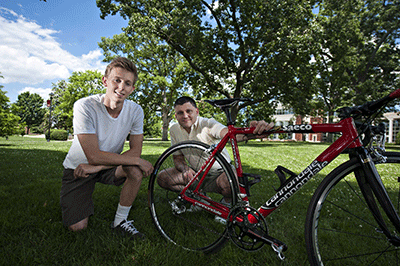 At University of Lynchburg, students develop close working relationships with faculty both in the classroom and beyond. Some, like physics student Chad Hobson ’17, say that the opportunity to participate in student/faculty research is one of the most beneficial experiences during college.
At University of Lynchburg, students develop close working relationships with faculty both in the classroom and beyond. Some, like physics student Chad Hobson ’17, say that the opportunity to participate in student/faculty research is one of the most beneficial experiences during college.
Chad,a physics major and math minor from Lynchburg, is assisting Dr. John Eric Goff, professor of physics, with research this summer aimed at predicting the winning times for each stage of the Tour de France. The 101st Tour de France, which began July 5 in Leeds, England and ends July 27 in Paris, consists of 21 stages and covers a distance of 3,656 kilometers. Using physics, Dr. Goff and Chad will predict the optimal time each stage should take.
Author of Gold Medal Physics: The Science of Sports, Dr. Goff is providing commentary on his blog, where you can follow their predictions, which will be posted the day before each stage.
Chad received a Virginia Foundation for Independent Colleges (VFIC) Undergraduate Science Research Fellowship Award to help Dr. Goff continue with his work. Under Dr. Goff’s guidance, Chad is developing an empirically-determined continuous power model for a typical elite Tour de France cyclist.
“We have to go through and map out every stage into right triangles and analyze how much time it takes to get through them,” Chad said. “It’s lots and lots of work … but it’s great to see the background of things I’ve been interested in for years.”
According to Dr. Goff, who chairs the physics department at LC, “Chad is progressing wonderfully. After just a year of intro physics, he’s doing sophisticated computations and making serious contributions to cutting-edge research.”
Chad is one of several students who have worked with Dr. Goff on the Tour de France modeling. Last year, student Brian Ramsey ’15 was awarded the VFIC William E. Betts Jr. Undergraduate Science Research Fellowship Award to expand on research completed the year before. Aakar Verma, a 21-year-old mechanical engineering student from New Delhi, India, completed a two-month research internship with Dr. Goff in 2011. Aakar, who loves sports, found an internet paper by the physics professor on the aerodynamics of a soccer ball, and emailed him. Their correspondence turned into international collaborative research between the two.
Dr. Goff has expanded Chad’s research portfolio this summer from Tour de France work to include the work he’s been doing with his Japanese colleagues on soccer balls. “Like Brian Ramsey did the previous two summers, Chad Hobson is assisting me to push the envelope of sports physics research,” Dr. Goff said.
An LC soccer player, Chad said he has grown up as a sports enthusiast. “Every year my family has watched the Tour de France,” he said. “Both my parents were triathletes.” Chad said he hasn’t learned anything that will change the way he plays soccer, however. “Mentally it’s a fast-paced game.”
This is the seventh year Dr. Goff has predicted winning times for the Tour de France. During the last three years, he said the predictions came pretty close. “If there’s a crash or it’s raining, that’s always a good explanation of why we might be a little bit off,” he said, noting that one year a strong tailwind significantly reduced the cyclists’ times.
Dr. Goff, who is working on a textbook on the physics of sports, has presented at international conferences on the physics of sports and is often sought by the media to explain how athletes are physically able to do what they do.

